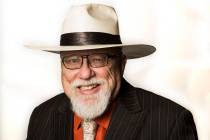Hold message helped save a life
If you get into a shootout with a thug who’s already shot five other people, Fred Bedient learned it’s best to pump your first bullet into your attacker’s head to avoid getting hit yourself.
He also learned that if a dude suddenly pulls a gun from beneath his shirt and puts it to your head, it makes good sense to smash the gun into a wall with one hand while pulling your own revolver to fire a round into your assailant’s chest.
In 31 years as a cop in Detroit — much of it served during the ’60s, ’70s and ’80s when the Motor City was known as the Murder Capital of the World — Bedient learned a lot.
He even learned to be ready to duck while writing a speeding ticket.
“I couldn’t believe it,” says the 70-year-old Bedient, who retired two weeks ago from a second career as security and communications director of the Valley Health System in Las Vegas. “Some guy drives by and it became obvious that he didn’t like me giving a guy a ticket because he started shooting at me. I was always ready to get down after that.”
There’s more, so much more that Bedient learned in Detroit.
If it turns out that you lose your gun when a driver you’ve stopped suddenly puts the pedal to the metal and you start getting dragged down the street on the passenger side of the car, Bedient found out that if you’re in shape you can still struggle into position to choke the guy and get the ignition turned off.
Staying in shape, Bedient is convinced, had a lot to do with him being quick enough to stay alive. Well into his 50s the 6-foot-2-inch, 210-pound cop was involved in rigorous workouts, including fast-paced city league basketball and hockey.
Yet it’s what Bedient didn’t learn in Detroit — that an apparent toothache and jaw pain can signal an impending heart attack, just as agonizing chest pain does — that he now wants to focus on.
Ignorance, he says, definitely isn’t bliss.
In fact, he says it almost killed him in 2011.
With February National Heart Health Awareness Month, he’s become a kind of an ambassador for making sure people recognize what may appear to be strange signs of heart disease.
“I was just lucky that I found out in time,” he says. “I don’t want other people to have to rely on luck.”
Three years ago, Bedient started feeling pain in his jaw that he chalked up to a bad tooth. He even thought it could be abscessed because he felt a little dizzy on the golf course. When he went to the dentist, he was treated for a small cavity.
“I thought that would be it, but I started noticing when I walked that the pain would get worse.”
Then one day, with pain in his jaw becoming more pronounced as he walked around a hospital, he made a phone call within the Valley Health System and was put on hold. The recorded message he heard described symptoms of a possible heart attack, including pain in the back, neck, stomach or jaw.
“That may have been the first time I was put on hold at Valley,” Bedient says, laughing. “I’m glad I was. I never knew pain in the jaw could be a sign of a heart attack.”
A quick trip to his primary physician led to a referral to cardiologist Dr. Charles Ruggeroli. A cardiac catheterization revealed three blockages in Bedient’s heart. That was quickly followed by a triple bypass performed by surgeon Dr. Neel Dhudshia.
“He was lucky he didn’t have a heart attack,” Dhudshia says. “Very lucky.”
A heart attack occurs when blood flow to part of your heart is blocked long enough so part of the heart muscle is damaged or dies. Blood clots caused by a buildup of plaque inside the walls of coronary arteries often create the blockage.
Bedient couldn’t be happier that he avoided a heart attack. Because he did, none of his heart muscle was lost. Baby aspirin and a cholesterol lowering drug are the only medications he takes.
“I can still play all the golf I want, and work out, with no problems,” he says. “I feel great.”
According to the American Heart Association, someone in the U.S. experiences a heart attack about every 34 seconds. And most don’t start like the “movie heart attack,” where someone clutches his chest and falls to the ground.
Early warning signs can include shortness of breath, heartburn, cold sweats, nausea, sudden fatigue, sleep disturbance, throat discomfort or lightheadedness — symptoms that can be confused as warning signs of other illnesses.
Those signs, along with pain in the jaw or other parts of the body, may come and go, as Bedient’s did.
Most symptoms, Ruggeroli says, require only a trip to a primary care doctor, which may result in tests and possible treatment. But he says anyone with unrelenting symptoms should dial 911 and head to the emergency room.
It’s important not to drive yourself because first responders can begin life-saving treatment on the way to the hospital.
Shot at 15 times, but never hit, in his police career, Bedient figures he would have died on the golf course — the pain in his jaw became worse when he played — if he hadn’t heard the telephone recording the Valley Health System played.
Now, whenever he’s put on hold on any phone call, he listens.
“You never know what you may learn,” he says.
Contact reporter Paul Harasim at pharasim@reviewjournal.com or 702-387-2908.

















